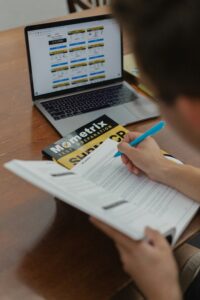
When it comes to studying for exams and surviving exam season, there are a multitude of resources online. They tell you to study every day, eat certain foods to keep your brain sharp, and to take breaks every half an hour or less.
These tools work perfectly for some people, but aren’t so ideal for others. As a teen, I know that youth can find it hard to balance multiple lifestyle changes at once and stick to a strict schedule that they aren’t used to. It’s hard for growing minds to be disciplined all the time!
As a youth who is about to embark on her final exams, I have compiled a list of small tips for anyone who is studying for multiple exams to incorporate into their lives– without making too many huge lifestyle changes. I have found that these small tweaks in my daily routine during exam season have made a noticeable difference on my stress levels and academic performance. These are what work for me specifically!
1. Start The Day Right
During exam season, you may see tips online that tell you to wake up at 4 a.m. and begin studying, but this isn’t sustainable for most youth. Unless you’re already used to it or have a pristine sleep schedule, I have found that waking up that early has only made my productivity throughout the day worse and I end up tiring out faster. Rather than forcing myself to work during early morning hours, I wake up at a comfortable time (8 a.m.) while ensuring that it’s not too late into the day.
Starting the day right has proven to be the most important method for me, and by this, I don’t mean studying the second you wake up. When you wake up, don’t reach for your phone. Being on your device first thing in the morning makes you incredibly susceptible to procrastination.
Instead, do a small task that sets the tone for the rest of your day. An example of a small task to prepare for your studying includes tidying your study space, opening a window, drinking a glass of water, or going for a walk if you’re feeling ambitious. This allows you to get into the right mindset for locking in.
2. Use “Focus Windows”

Focus Windows are times throughout the day which you know you’ll naturally feel more alert and productive. Instead of forcing yourself to study when you’re tired or distracted, identify your personal high-energy hours, whether it’s in the mid-morning or early evening. Use that time to tackle your most challenging subjects.
During these focus windows, get rid of all distractions by putting your phone on Do Not Disturb, clearing your workspace, and ensuring your family knows you plan on focusing for the next hour or so. Set a clear goal for what you want to achieve, like getting at least 30–45 minutes of focused work before taking a brain break. This method is more effective than spending hours of distracted studying.
3. Reward Yourself Fairly
Once you know you can’t have something, you tend to want it more. Instead of focusing on studying, your brain will be thinking about the one thing you can’t have, but want desperately. By restricting yourself from TV time, junk food, or doing things you enjoy (whether they’re beneficial to your studying or not), you will only feel the need to do them more.
Rather than letting this distract you, use this to motivate yourself. Give yourself a reward (e.g. a piece of cake) to work towards. If you complete the task, chapter you’re studying, or flashcard set, give yourself 10 minutes maximum for a small treat before getting back in the zone. Ensure that you don’t let the reward fuel your procrastination by saving the “bigger” rewards (like playing video games) till your studying for the day is finished.
4. Use Your Breaks Wisely

This may sound contradictory since breaks are supposed to be your designated time to fully zone out, but how you spend your short breaks throughout the day will drastically impact your overall productivity. I’m not saying you have to be productive during your breaks, that goes against the whole meaning of one. Instead, try to stay away from social media or using your devices, and other long-term distractions. A good book can also be hazardous as well, since it’s difficult to stick to the schedule you have when you want to continue doing what you enjoy.
Try using your breaks to get a breath of fresh air, or speaking to someone close by in-person. If you know you’ll be able to go back to work after your time is up, reply to that one text or email that’s been on your mind. To sum it all up, do something that won’t derail your focus and schedule for the rest of the day by finding short-term distractions. If you’re having trouble focusing in again, get yourself a drink or a snack to enjoy while studying. I find that using a new pen or stationery always get me ready for the study grind.
5. Make Your Study Plan As Specific As Possible
When it comes to that one subject that you know you’ll struggle in, this tip will come in handy. Your plan shouldn’t be “Study Chemistry for 2 hours”, it should sound more like “Watch a video on acids and bases”, “go through bonding unit flashcards”, and “try one practice exam.”
Break down your weaknesses beforehand and focus on them directly using specific tasks. This way, your brain will have to do much less work figuring out how to study for the exam during your study time. Instead of avoiding your worst subject entirely, schedule short, low-pressure study sessions to get familiar with the topic. It’s okay to have some slow days as well, give yourself less material on days when you know you’ll be more tired.
6. Romanticize It (Just A Little Bit)

Before you roll your eyes, note that I’m not telling you to become a vlogger or StudyTuber right before your exam. Setting the study mood and getting the right vibes from your environment can go a long way. It’ll be impossible to focus in a bleak setting, and those math problems will start feeling tedious and boring. By doing something small like lighting a candle, making yourself a cool drink, or putting on a themed playlist, your calculus work might just suck less.
Get into the Rory Gilmore mindset and imagine you live in Stars Hollow if that’s what it takes for studying to be more bearable!
TL;DR
A lot of exam tips online can feel unrealistic for teens juggling school, life, and stress. Instead of forcing major lifestyle changes, here are small strategies that helped me during exam season:
-
Start the Day Right: Wake up at a reasonable time, skip the phone, and do a small task to get into study mode.
-
Use “Focus Windows”: Find your naturally productive hours and use them for your hardest tasks
-
Reward Yourself Fairly: Instead of cutting off all fun, use small rewards (like a treat or quick break) to stay motivated without falling into procrastination.
-
Use Breaks Wisely: Avoid long distractions like social media or books. Take short, refreshing breaks to reset without derailing your focus.
-
Be Specific With Study Plans: Don’t just plan to “study”. Break it down into small, clear tasks.
-
Romanticize It: Set the vibe with candles, drinks, or music to make studying feel a little less like torture and a little more like a cozy movie.
Good luck on all your future exams!

Thank you Suha! I will be sure to utilize these helpful tips.
No problem Halle!
Comments are closed.